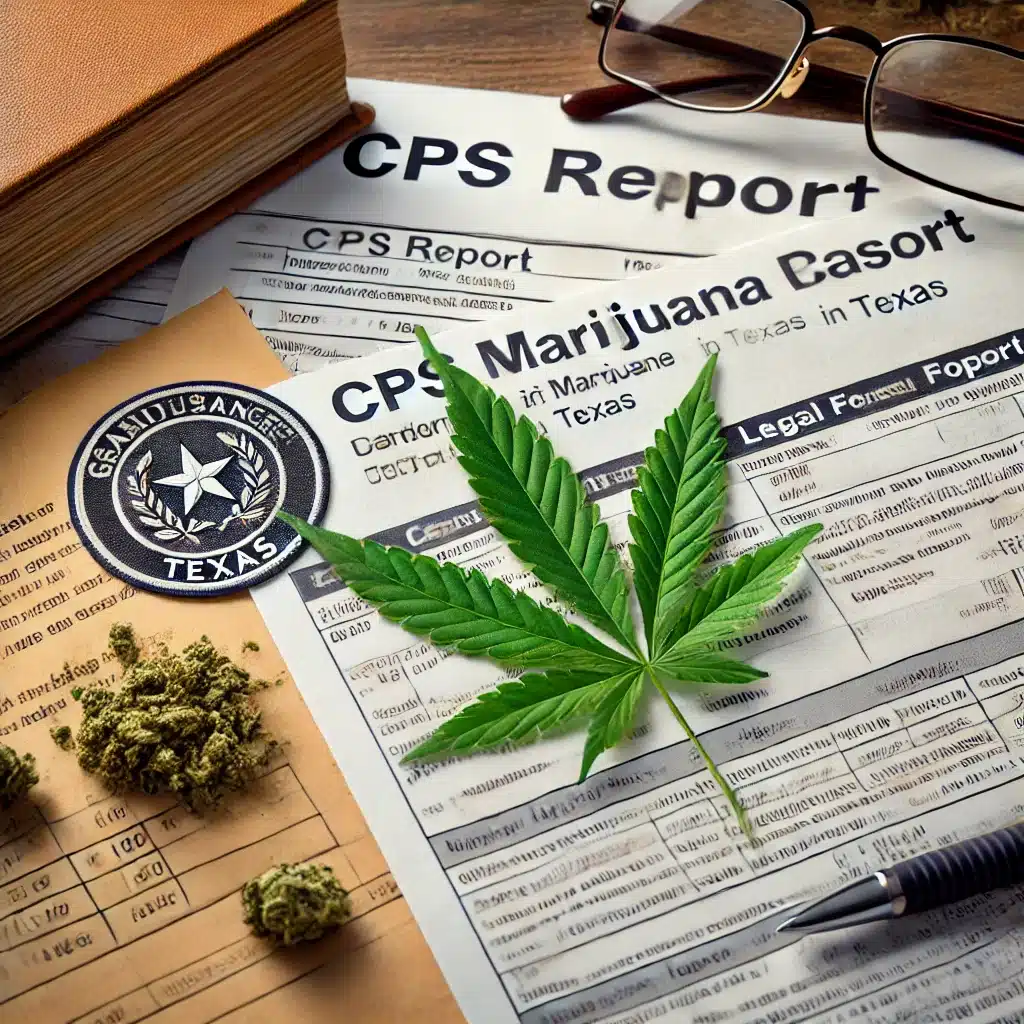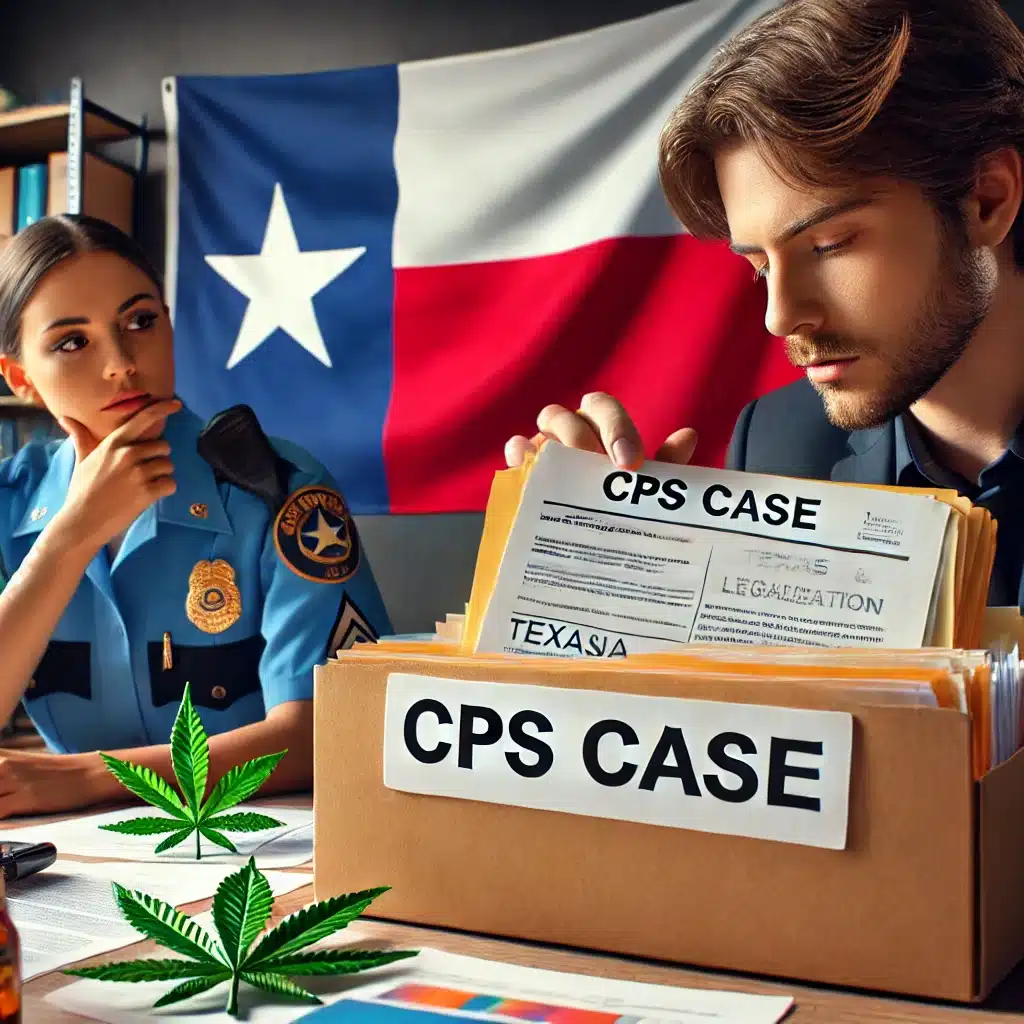Understanding CPS and Marijuana Use in Texas: What Parents Need to Know
Picture a Texan sunset casting a golden hue over a sprawling landscape, where families thrive and face the quirks of modern life. Now, imagine this: you, a parent, sitting under that Lone Star, pondering a question that’s been itching at your curiosity. It’s a question that’s as big as the Texas sky and as intriguing as a wild west tale – “Can Child Protective Services (CPS) take my child for smoking weed in Texas?”
Well, pardner, hold onto your hat because in this riveting guide, we’re saddlin’ up to ride through the realm of CPS, the maze of Texas marijuana laws, and the showdown parents might face when it comes to cannabis consumption. Yeehaw!

Yep, we’re diving deep into the Lone Star State’s Child Protective Services, marijuana laws, and what could happen if you’re toking in Texas. So, stick around, partner, ’cause this here guide is your ticket to understanding how to keep your family’s wagon rollin’ safe and sound in Texas.
In the sprawling landscape of Texas, where the Lone Star shines bright, families grapple with the intricacies of modern life. Among the questions that occasionally surface in the minds of parents, one looms large: “Can Child Protective Services (CPS) take my child for smoking weed in Texas?” In this comprehensive guide, we embark on a journey through the realm of CPS, the labyrinth of Texas marijuana laws, and the potential repercussions parents may confront when it comes to cannabis consumption.
Child Protective Services (CPS) in Texas
Overview of CPS in Texas, its role, and responsibilities.
Child Protective Services, or CPS, stands as a sentinel for the welfare and safety of children across the vast state of Texas. Their mission is nothing short of noble: safeguarding children from neglect, abuse, and harm. However, what occurs when the agency’s concerns veer into a parent’s marijuana use?
Child Protective Services (CPS) in Texas plays a crucial role in ensuring the safety and well-being of children. Their primary mission is to protect children from neglect, abuse, and harm. However, when it comes to parental marijuana use, questions about CPS involvement often arise.

Marijuana Laws in Texas
Let’s commence our exploration with a dissection of Texas marijuana laws. Unlike some states that have embraced full-scale legalization, Texas maintains stricter regulations. Presently, both recreational and medical marijuana use remain illegal, underscoring the urgency for parents to comprehend the legal landscape.
In Texas, marijuana laws are notably stringent. Unlike some states that have legalized recreational or medical marijuana use, Texas maintains strict regulations around cannabis. Both recreational and medical use of marijuana remains illegal, making it crucial for parents to fully grasp the legal framework.
CPS Investigations
CPS investigations can be set in motion by an array of catalysts. Concerned neighbors, educators, or even anonymous tips can set the wheels in motion. Suspicion of parental substance abuse, including marijuana, serves as one such trigger. A comprehensive understanding of these investigations is indispensable.
CPS investigations are initiated through various triggers. Concerned neighbors, educators, or anonymous tips can spark an inquiry. Suspicion of parental substance abuse, including marijuana, is one such trigger. Thus, it is paramount to comprehend the intricacies of these investigations.
Effects of Marijuana Use on Children
Now, let us delve into the heart of the matter – how a parent’s marijuana consumption may influence their children. While the debate over the severity of these effects continues, it remains critical to fathom the possible ramifications.
The impact of parental marijuana use on children’s well-being is a complex and debated topic. While some argue that it poses minimal harm, others express concerns about potential consequences. Understanding these effects is essential for parents.

Legal Consequences
The quintessential question emerges: What legal ramifications await parents who engage in marijuana use in Texas? CPS involvement looms as a plausible outcome, rendering it imperative for parents to acquaint themselves with potential consequences.
The million-dollar question is this: What are the legal consequences when parents use marijuana in Texas? CPS involvement is a possibility, and understanding the potential outcomes is crucial for parents.
Parental Rights and Responsibilities
Texas legislation meticulously outlines the rights and obligations of parents concerning child custody and care. These rights bear immense significance in shaping CPS’s course of action when marijuana use is involved.
Texas law provides a detailed framework for parental rights and responsibilities concerning child custody and care. These rights play a pivotal role in influencing CPS’s actions in cases involving parental marijuana use.
CPS Interventions
When CPS harbors suspicions of child endangerment due to marijuana use, they may embark on various courses of action. Being cognizant of what to anticipate in such situations is of paramount importance.
If CPS suspects child endangerment due to marijuana use, they have a range of actions they can take. Understanding these actions is crucial if you find yourself in this situation.
Child Custody and Visitation Issues
Marijuana use can cast a shadow on child custody and visitation arrangements in Texas. It is essential to be well-informed about how these matters are addressed within the framework of Texas law.
Marijuana use by a parent can impact child custody and visitation agreements in Texas. Understanding how these issues are handled under Texas law is crucial.
Legal Representation
In scenarios involving a CPS investigation linked to marijuana use, securing legal representation is advisable. A profound comprehension of your rights in this context is pivotal.
If you are facing a CPS investigation related to marijuana use, it’s highly recommended to seek legal representation. Understanding your rights in this context is paramount.
Substance Abuse Treatment Options
For parents grappling with substance abuse, including marijuana use, a spectrum of resources is accessible within Texas. Seeking assistance can be a proactive step towards resolving CPS concerns.
For parents struggling with substance abuse, including marijuana use, there are resources available in Texas. Seeking help can be a positive step toward resolving CPS concerns.
Know Your Rights
A comprehension of your rights is pivotal when contending with CPS investigations. Recognizing what actions you can and cannot take is imperative in navigating these challenging scenarios.
Understanding your rights is essential when dealing with CPS investigations. Knowing what you can and cannot do is crucial in these challenging situations.
Preventive Measures
Prevention often proves the most prudent course of action. We will delve into strategies that parents can employ to avert CPS involvement linked to marijuana use.
Taking preventive measures can often be the best approach. We will explore strategies that parents can use to avoid CPS involvement related to marijuana use.
Case Studies and Examples
To impart a tangible understanding of the real-world implications of marijuana use on CPS involvement, we will delve into pertinent case studies and examples.
To illustrate the real-world impact of marijuana use on CPS involvement, we will delve into some case studies and examples.
CPS and Medical Marijuana
The realm of medical marijuana adds complexity, even in states with legalized medical usage. We will examine how CPS navigates the terrain of medical marijuana in Texas.
Medical marijuana is a complex issue, even in states with legalized medical use. We will explore how CPS views medical marijuana in Texas.
Recent Legal Developments
Lastly, we will scrutinize any recent legal developments that might impact how CPS handles cases entwined with parental marijuana use.
Finally, we will examine any recent legal developments that could affect how CPS handles cases involving parental marijuana use.
In the expansive tapestry of Texas, where individual freedoms intersect with the welfare of children, the question of whether CPS can take your child for smoking weed is complex. By understanding the nuances of Texas law, your rights as a parent, and the potential consequences of marijuana use, you can navigate this challenging terrain with confidence. In the Lone Star State, knowledge is power, and it’s essential to be well-informed when it comes to your family’s well-being.
Well, folks, as we round up our wild ride through the Texan frontier of CPS, marijuana laws, and parental puff-puff-pass moments, it’s time to lasso in some wisdom.
Remember, in the vast tapestry of Texas, where tumbleweeds roll and BBQ smoke fills the air, the question of whether CPS can swoop in for a weed-related family feud can be as bewildering as a lost armadillo. But fear not, partners, because knowledge is your six-shooter here.
Short Answer
So, can Child Protective Services (CPS) take your child for smoking weed in Texas? It’s possible, but by understanding the law, your rights, and the ropes of the legal corral, you’re arming yourself with the best defense for your family’s well-being.
So, next time you gaze at that Lone Star, just remember, you’re the sheriff of your family’s destiny. Saddle up, stay informed, and keep ridin’ tall in the saddle, Texan style!

Ebook
 If you want to know more about what you can do, CLICK the button below to get your FREE E-book: “Child Protective Services E-Book.”
If you want to know more about what you can do, CLICK the button below to get your FREE E-book: “Child Protective Services E-Book.”
Other Related Articles:
- How using marijuana can have an effect on a child custody case in Texas
- High Stakes: Marijuana Use in Texas
- Failing a CPS Drug Test for Marijuana in Texas
- Does CPS test for marijuanas
- Substance Abuse and Child Custody in Texas: A Comprehensive Guide for Parents
- Safety, Substance Abuse and Mental Health: Helping yourself through a Texas family law case
- Sober up or risk losing your children: Substance abuse and divorce in Texas
- How long does it take CPS to get a court order for a drug test
- Smoking Weed in Texas: CPS, Legalities, and Parental Rights
- How many times can CPS drug test you
- Your attorney’s role in a Child Protective Services case
Frequently Asked Questions
Yes, smoking weed in Texas can potentially lead to a loss of custody, as it may be considered endangering the child’s well-being.
Smoking weed around a child in Texas can result in legal trouble, as it may be seen as exposing the child to illegal substances.
CPS can remove a child in Texas if they find evidence of abuse, neglect, endangerment, or other serious concerns for the child’s safety and well-being.
CPS in Texas has the authority to investigate child welfare concerns, provide services, and if necessary, take legal action to protect a child’s safety.




